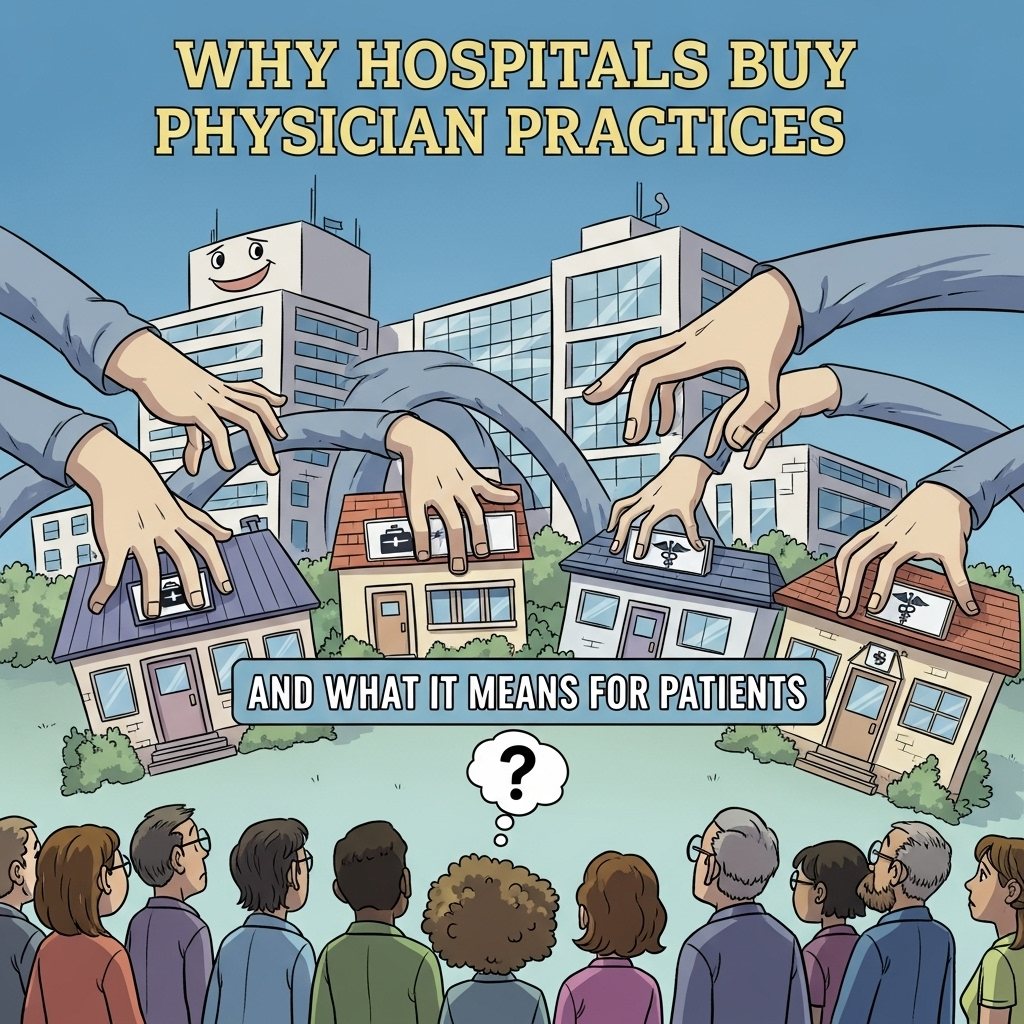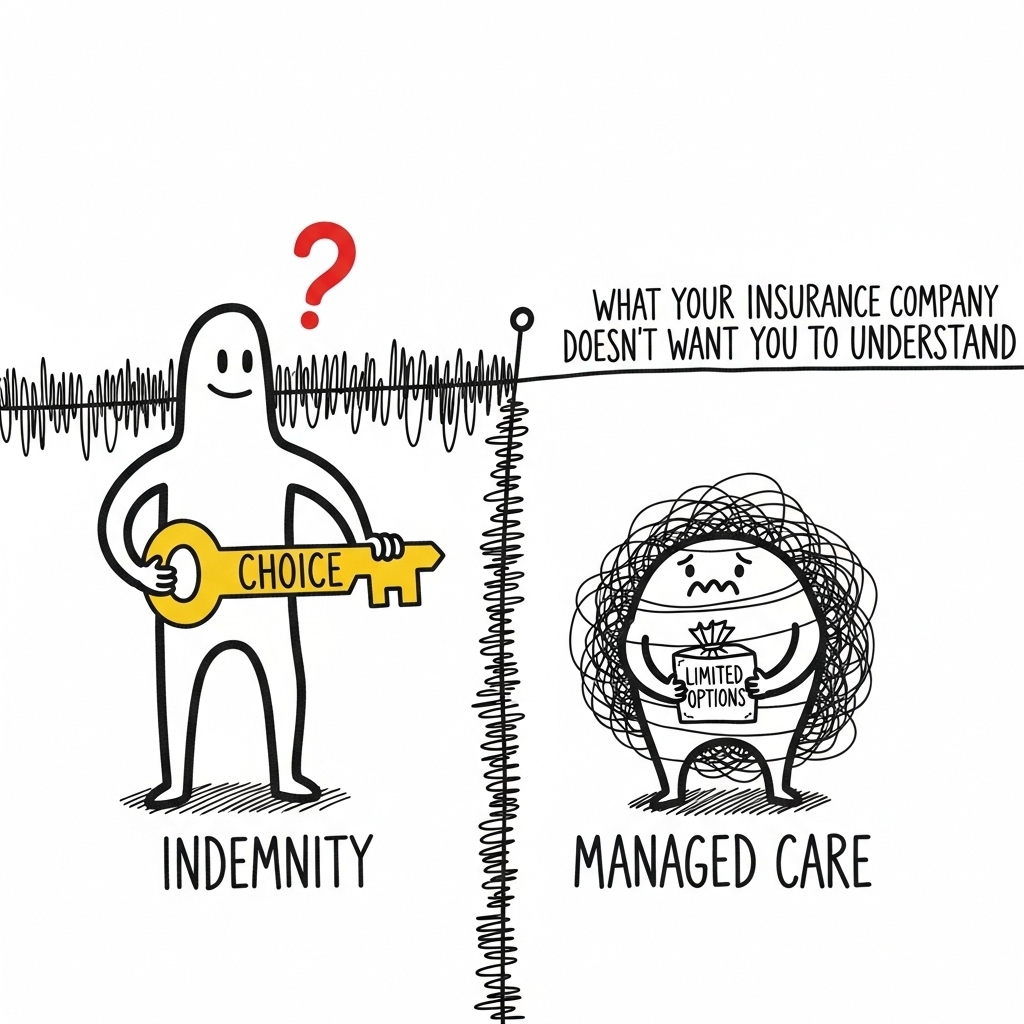
Why Hospitals Buy Physician Practices (and What It Means for Patients)
Doug Jorgensen
March 11, 2025
Introduction: The Consolidation Wave
If you’ve noticed more independent medical practices being absorbed into hospital systems, you’re not imagining things.
Across the country, hospitals and health systems are buying physician practices at an accelerating pace.
This isn’t just a real estate transaction—it’s a shift that affects how care is delivered, how much it costs, and who controls the patient-provider relationship.
Why Hospitals Are Buying Practices
1. Market Share and Referral Capture
By owning physician practices, hospitals control the referral pipeline—directing patients to their own specialists, imaging centers, and surgical facilities.
2. Negotiating Power
Larger systems can negotiate higher reimbursement rates with insurers by leveraging their network size.
3. Integration of Care
In theory, integrating hospitals and physician groups can improve care coordination, reduce duplication, and streamline patient transitions.
4. Financial Stability for Hospitals
Physician offices can be a steady source of patient flow into higher-margin hospital services like surgery and diagnostics.
Why Physicians Are Selling
Independent practice ownership has become increasingly challenging due to:
- Rising overhead costs (staff, technology, compliance)
- Stagnant or declining reimbursement rates
- The administrative burden of running a business
- Desire for predictable income and fewer management responsibilities
Selling to a hospital can provide:
- Financial security
- Relief from business management
- Access to better infrastructure and resources
Many medical students and residents dream of owning and operating their own practice. However, experienced healthcare professionals, let alone new ones, face significant challenges due to the costs, administrative and regulatory burdens, and the constantly evolving landscape of the U.S. healthcare system.
What It Means for Patients
Potential Benefits:
- Better care coordination within a single system
- Access to more comprehensive services under one umbrella
- Potentially improved electronic health record integration
Since most electronic health systems are proprietary, they often struggle to share data effectively. However, within a single system, a common health record allows your doctors real-time access to your information.
Potential Drawbacks:
- Higher costs—hospital-owned practices often bill at hospital “facility” rates, which can significantly increase patient charges for the same services.
- Reduced competition, which can lead to higher prices and fewer choices.
- More pressure to stay “in-network” within the hospital system.
It’s important to know when to seek an out-of-network provider or a second opinion. Healthcare networks often have preferred doctors or groups for each specialty, and you might find that seeing someone else is subtly or overtly discouraged within these groups.
The Financial Side: Facility Fees
One of the most controversial aspects of hospital acquisition is the facility fee.
When a hospital owns a physician practice, it can often bill the visit as a hospital outpatient service—adding hundreds of dollars in fees, even if the appointment is in the same physical location as before. And yes, it is perfectly legal. You may not pay more, but we all pay more if it’s not medically needed.
This practice is entirely legal. While direct payments may not increase, unnecessary medical charges (i.e.: the same procedure in the same office now classified as an ASU) ultimately leads to higher costs for everyone.
The Bigger Picture: Consolidation and Competition
According to recent data, more than three-quarters of physicians in the US are now employed by hospitals or corporate entities. Two decades ago more than half owned their own practices.
While consolidation can create efficiencies, it can also:
- Limit independent practice options
- Reduce competition in local markets
- Shift decision-making from physicians to administrators
Questions Patients Should Ask
If your doctor’s office is acquired by a hospital system:
- Will the cost of my visits change?
- Will my doctor still have the same control over treatment decisions?
- Will I be required to use certain specialists or facilities?
- Is there a change in how billing will appear?
Final Thoughts: The Balance Between Scale and Independence
Hospital acquisition of physician practices isn’t inherently good or bad—it’s a response to the economic and regulatory realities of modern healthcare.
The key is ensuring that consolidation benefits patients through improved access and quality, rather than simply driving up costs.
Bigger systems can bring big advantages, but only if the patient remains at the center of the equation.
About the Author
Douglas J. Jorgensen, DO, CPC, FAAO, FACOFP
Dr. Doug is a physician, consultant, and national educator on healthcare policy and regulatory compliance. He works with healthcare organizations to balance growth strategies with patient-centered care.


